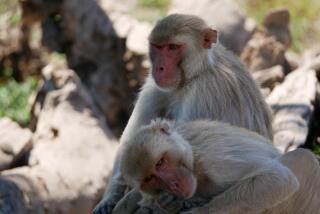Why Men Just Have to Monkey Around
- Share via
Celebrating the team’s fifth NBA championship, Chicago Bull Luc Longley bounces his chest off Scottie Pippin’s. Brian Williams punches Jason Caffey’s stomach. Clenched fists are knocked all around.
Menfolk greet each other with a whack, a headlock or the ever weird noogie. Whatever happened to a handshake? Fuhgedaboutit. Pounding on a pal is a more manly way to express emotion. The world of male bonding is a strange mix of pleasure and pain, a pastiche of pseudo-aggressive gestures that may appear hostile to the non-initiate (read: women) but are the highest “my bud” semaphore to the manly man.
Homo sapiens males may have elevated buddy bonding to an art form, but they certainly don’t have a corner on the behavior. Dogs do it. Rats do it. And, well, most social mammals do it. Scientists conjecture that such male-on-male horseplay underlines an innate ambivalence males feel toward each other as both potential friends and foes.
The mock assault serves animals and human males similarly: to test strength, reassure one another, forge alliances and express the joy of defeating enemies.
“It is the most pronounced sex difference in humans, nonhuman primates and in rats and rodents,” says Kim Wallen, an expert on gender differences in rhesus monkeys and a research professor of psychobiology at the Yerkes Regional Primate Center at Emory University in Atlanta. “It looks like real fighting, but the animals know the difference between when a friend does it and an enemy does . . . sort of the way men do when someone slaps them on the back.”
Chimpanzees--the best human analogue because they must cooperate to combat common enemies and compete for females and rank--do something called “message play.”
“Instead of beating up on an adolescent male, an adult male starts very roughly tickling . . . playfully slapping him and shoving him but giving him the message that he could beat him up if he wanted to,” says Frans de Waal, a primatologist at the Yerkes center and author of several books on primates.
“It is turning tension into play. It is a bit like tension between guys and they turn it into a joke.”
A man among men may cement an alliance with an endearing thwack to the biceps, but chimpanzees have their own way unique way of saying, “Hey, man, I’m with you.” Say a leopard with chimp alfresco on the brain is stalking. Male chimps might hug, kiss (which men go to great lengths to avoid), go scrotum to scrotum, mount each other or grab each other’s penises (also not likely to be seen at a Super Bowl party).
“When two males hear the calls of a chimp of a neighboring community, the dominant male reaches out and grabs the penis of a male who is partly a rival and partly a friend,” says Richard Wrangham, an anthropology professor at Harvard University and author of “Demonic Males” (Houghton Mifflin Co., 1996). “ ‘Are you with me against the invaders?’ is the meaning. They are refreshing their bond and testing their willingness to invest in each other at a time of need.”
Following a big fight between two males, chimps will reassure each other with a quick “testicle bounce.”
“They will take their hand and bounce each other’s testicles,” says psychologist Roger Fouts, a psychology professor at Central Washington University who has studied chimpanzees for 30 years. “It lasts a few seconds. There is no sexual intent.”
The significance of the genitals from a sociobiological point of view is simple, De Waal says: “They are letting someone take their reproductive future in their hands. Little boys, when scared, will also touch their genitals.” (Never mind that some grown-up men never outgrow this form of self-reassurance.)
But even in the hurly-burly of the animal world, there is some downtime when guys just want to hang out together and be, well, guys.
“When two male baboons are getting along together, they will just walk up casually and yank on each other’s penis,” says Robert Sapolsky, professor of biology and neuroscience at Stanford University and author of “The Trouble With Testosterone” (Scribner, 1997). “It is the equivalent of two dogs rolling on their backs” and sniffing each other, he says, bringing genitals in close proximity to teeth. “That is the most vulnerable you can make yourself.”
*
After cashing in on those male alliances in fights or in chasing off predators, chimps and other animals do what might be the equivalent of a “triumph dance,” says De Waal. The term was coined by ethologist Konrad Lorenz to describe the elongated neck, trilling calls and general wing-flapping glee exhibited by geese after driving off attackers.
Chimps may not chest-bounce like the Chicago Bulls, but they do thrash the ground with branches, whip saplings around, throw sticks and stones, and drum with their hands and feet on the buttress roots of trees, as though they were attending an “Iron John” workshop.
“It is typically a kind of dominance display,” says William McGrew, a primatologist at Miami University in Oxford, Ohio. “It could happen after a kill, interaction with neighbors, or it could be following a disruption within the group.”
Of course, sorting out the elements of play and aggression can be difficult, McGrew says. The best signal that this is play and not real aggression, he says, is the “play face”--the lips are loose and the corners of the mouth are drawn back. Things can get out of hand, “especially with juveniles testing to see how far they can go before another chimp screams.”
It can be sticky among human males as well. Crossing the line between friendly roughhousing and “extremely crude horseplay” is at the heart of a same-sex harassment case under review by the U.S. Supreme Court. The complainant alleges that the behavior of co-workers and a supervisor on an offshore oil-drilling platform in Louisiana “went beyond mere horseplay to constitute severe and pervasive harassment because of sex.”
The allegations of the case may seem particularly offensive, but even seemingly innocuous gestures of male camaraderie may not--by ‘90s standards, anyway--always be welcome. In a recent episode of the TV sitcom “Friends,” the character Chandler was irritated by a boss who expressed the company’s esprit de corps with a slap on the butt after pep talks. It’s one thing to get patted when engaged in battle, but quite another if it happens in more civilized environs. Context is everything.
“Mock aggression is men’s way of showing their ambivalence toward each other,” says Chris Kilmartin, psychology professor at Mary Washington University in Fredericksburg, Va.
“Men are encouraged to see all other men as competitors. Affection becomes distorted into all these kinds of displays of masculinity, unless they have bonded together killing something, literally in war or metaphorically in sports. Like if a friend made a good play in football, I can pat him on the ass, but don’t try it on Main Street.”
Professor Richard Eisler at the Virginia Polytechnic Institute puts it another way: “If two men are walking in the woods together, one of them better be carrying a rifle.”
More to Read
Go beyond the scoreboard
Get the latest on L.A.'s teams in the daily Sports Report newsletter.
You may occasionally receive promotional content from the Los Angeles Times.










